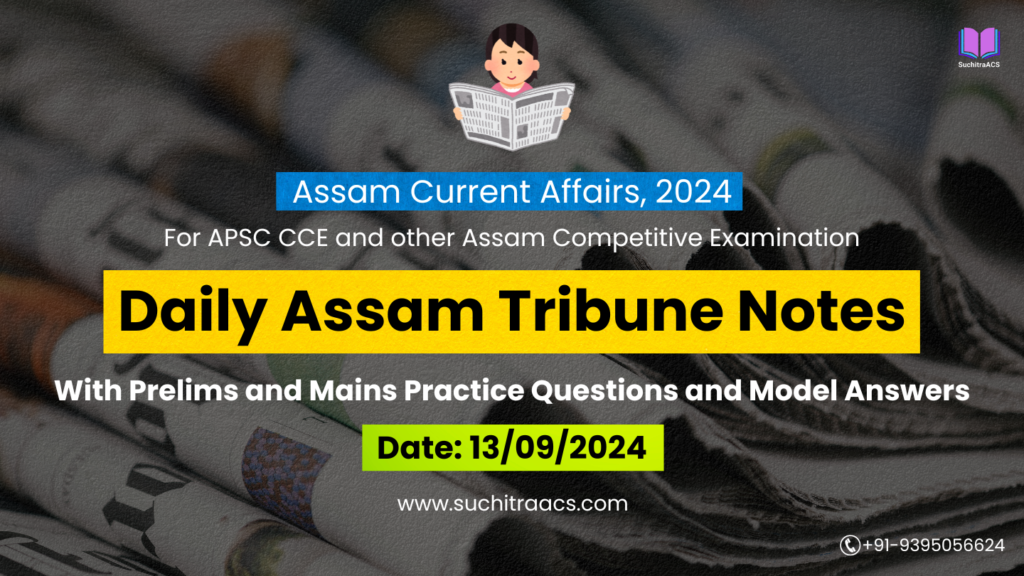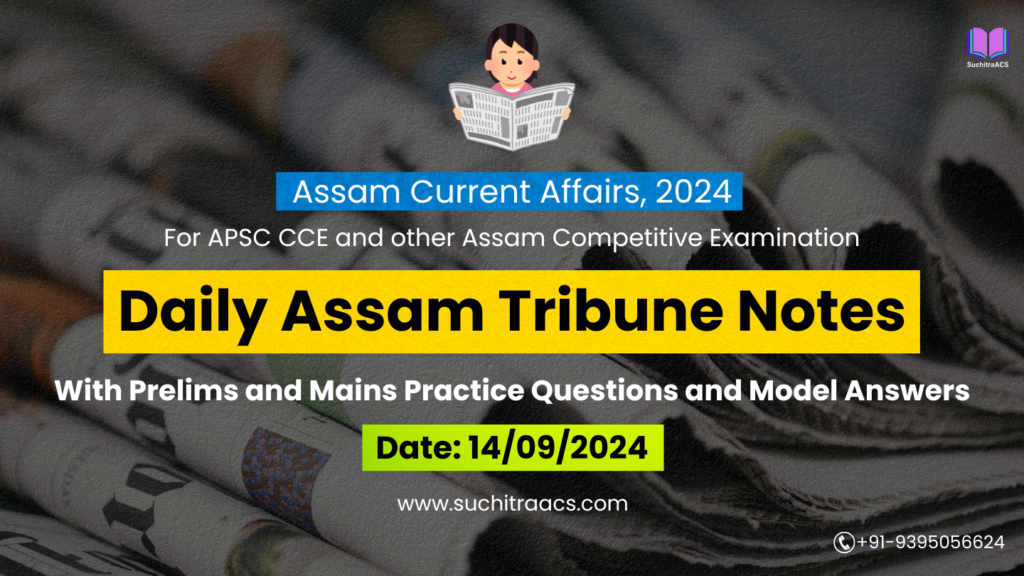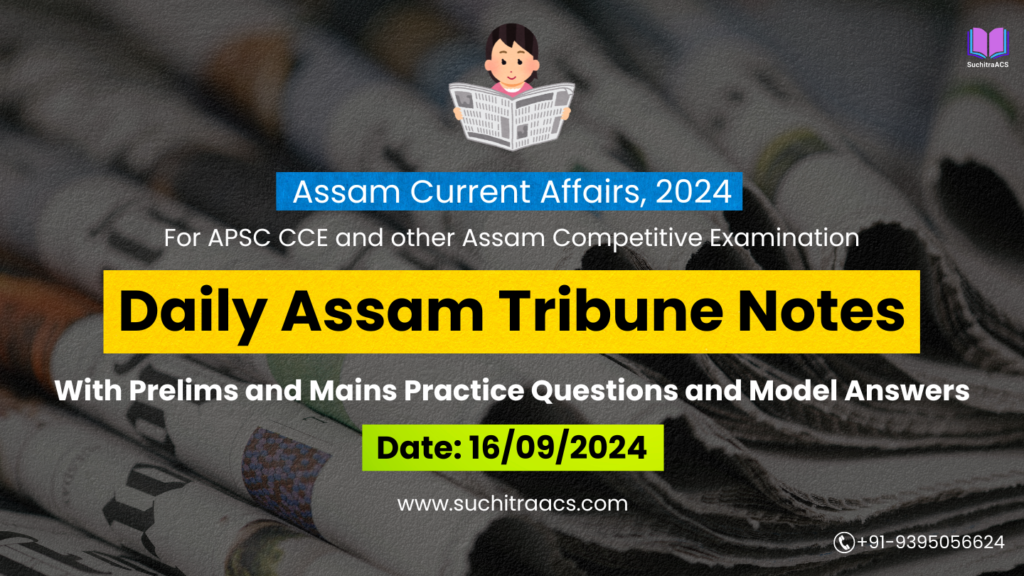APSC Current Affairs: Assam Tribune Notes with MCQs and Answer Writing (09/10/2024)
For APSC CCE and other Assam Competitive examinations aspirants, staying updated with current affairs is vital. This blog covers most important topics from the Assam Tribune today (09-10-2024). These issues are key for both APSC Prelims and Mains preparation, offering insights into the APSC CCE Syllabus.
1. CBI to Probe Multi-Crore Online Trading Scam
GS Paper II – Governance, Law, Public Administration
Introduction:
The Government of Assam has handed over the investigation of the multi-crore online trading scam to the Central Bureau of Investigation (CBI) to ensure a fair and thorough investigation. This move comes after several complaints of fraudulent online stock trading, which led to significant financial losses for individuals across Assam.
Key Points:
- Multi-Crore Scam: A large-scale online stock trading scam resulted in over 41 cases being registered, involving fraudulent practices in online trading platforms.
- CBI Involvement: The Assam Government requested the Centre to transfer the cases to the CBI for a more robust investigation.
- Assam Government’s Role: Assam CM Himanta Biswa Sarma emphasized the state’s commitment to ensuring justice for the victims and addressing the loopholes in online trading regulations.
Prelims Focus:
- CBI’s Role: Understanding the role of the CBI in handling complex and high-profile cases like financial frauds.
- Online Trading Fraud: Key terms like online trading platforms, stock market fraud, and the scope of regulation over such financial activities.
Mains Focus:
- Challenges in Regulating Online Financial Transactions: Examining the current regulatory framework for online trading and the role of regulatory bodies like SEBI (Securities and Exchange Board of India).
- Governance and Law Enforcement: Analyzing how state and central governments coordinate efforts to combat financial crimes, especially in the online space.
- Solutions: Enhancing the capacity of state law enforcement agencies and promoting awareness about online trading frauds to prevent such incidents in the future.
Conclusion:
The involvement of the CBI in probing the multi-crore online trading scam demonstrates the seriousness of the issue and reflects the government’s commitment to restoring confidence in the state’s financial ecosystem. Strengthening regulations and coordination between state and central bodies will be crucial in preventing similar scams.
2. Assam’s Delimitation of Panchayats Approved
GS Paper II – Polity, Panchayati Raj
Introduction:
The Assam Government has approved the recommendations for the delimitation of gaon panchayats, anchalik panchayats, and zilla parishads. This move is part of the broader effort to reorganize development blocks and improve local governance in Assam.
Key Points:
- Delimitation Process: The number of gaon panchayats will be reduced from 2197 to 2193, while the total number of zilla parishads will decrease from 420 to 397.
- Objective: To improve governance and ensure equitable distribution of resources and development in rural areas.
- Block Reorganization: The reorganization will cover all districts except those under the Sixth Schedule.
Prelims Focus:
- Panchayati Raj System: Structure and functioning of gaon panchayats, anchalik panchayats, and zilla parishads in Assam.
- Delimitation: What delimitation is and how it affects local governance.
Mains Focus:
- Impact of Delimitation on Rural Development: Analyzing how reorganization can enhance the effectiveness of local governance.
- Challenges in Panchayati Raj: Issues like inadequate resources, political interference, and the need for capacity building among local bodies.
- Solutions: Strengthening local institutions through capacity building and transparent resource allocation.
Conclusion:
The delimitation of panchayats in Assam is a significant step towards optimizing local governance. It promises better resource distribution, but its success will depend on effective implementation and minimizing political interference.
3. AFSPA Extended in Upper Assam Districts
GS Paper III – Security, Internal Security
Introduction:
The Armed Forces Special Powers Act (AFSPA) has been extended for six months in Upper Assam’s districts of Tinsukia, Dibrugarh, Charaideo, and Sivasagar, marking them as disturbed areas. This is part of the state’s ongoing efforts to maintain internal security and curb insurgent activities in the region.
Key Points:
- AFSPA: Provides special powers to the armed forces in disturbed areas to maintain public order.
- Security Concerns: The districts have been prone to insurgent activities, necessitating continued enforcement of AFSPA.
- Implications for Local Population: AFSPA has been controversial due to its potential impact on civil liberties.
Prelims Focus:
- AFSPA: Understanding the provisions and significance of the Armed Forces Special Powers Act.
- Disturbed Areas: What defines a “disturbed area” and the process of declaring such regions.
Mains Focus:
- Balancing Security and Human Rights: The role of AFSPA in maintaining internal security and the challenges it poses to human rights.
- Impact on Insurgency in Assam: The effectiveness of AFSPA in controlling insurgency in Upper Assam and alternative measures to address root causes of unrest.
- Governance and Law Enforcement: The role of law enforcement agencies and coordination between state and central forces in maintaining internal security.
Conclusion:
The extension of AFSPA in Upper Assam reflects the ongoing security challenges in the region. While it remains a necessary tool for maintaining peace, there must be continuous efforts to safeguard civil liberties and address the root causes of insurgency.
4. Assam’s Increasing Focus on Electric Vehicles (EV)
GS Paper III – Science and Technology, Environment
Introduction:
Assam has joined the national trend towards adopting electric vehicles (EVs) as part of its strategy to combat pollution and reduce the dependence on fossil fuels. The state has introduced several policies to encourage EV usage and infrastructure development.
Key Points:
- State EV Policy: Assam’s electric vehicle policy offers subsidies for the purchase of electric vehicles and aims to create a conducive environment for the transition to cleaner mobility.
- Charging Infrastructure: The government plans to set up multiple charging stations across the state to support the increasing number of electric vehicles.
- Environmental Benefits: EVs are seen as a solution to reduce air pollution, especially in urban areas like Guwahati where pollution levels have been rising.
Prelims Focus:
- State EV Policy: Key points from Assam’s EV policy, including subsidies and infrastructure development.
- Pollution Control Measures: EVs as a solution for urban air pollution.
Mains Focus:
- Sustainable Transportation: Discuss the role of electric vehicles in Assam’s efforts to promote sustainable transportation.
- Policy Implementation: Examine the challenges in implementing EV policies, including the development of charging infrastructure and public acceptance.
Conclusion:
The adoption of electric vehicles in Assam represents a significant step towards environmental sustainability. However, success will depend on the effective implementation of supportive policies and the development of necessary infrastructure.
5. Assam’s Initiative to Address Literacy through Literary Pensions
GS Paper II – Governance, Social Justice
Introduction:
The Assam Government has announced the continuation of the Literary Pension Scheme for the year 2024-2025. This initiative supports senior litterateurs who have made notable contributions to Assamese literature, ensuring their financial well-being.
Key Points:
- Eligibility Criteria: Senior writers who have significantly contributed to Assamese literature are eligible for the pension.
- Amount: A pension of ₹8,000 per month is provided to selected authors.
- Objective: The scheme aims to honor the work of Assamese writers and ensure their contributions are recognized and valued.
Prelims Focus:
- Literary Pension Scheme: Objectives, eligibility, and amount provided.
Mains Focus:
- Cultural Preservation: Discuss the role of literary pensions in promoting Assamese literature and preserving cultural heritage.
- Social Justice: Analyze the importance of providing financial assistance to elderly litterateurs as a form of social support.
Conclusion:
The Literary Pension Scheme is a positive initiative that reflects the Assam Government’s commitment to recognizing and preserving its rich literary heritage. Supporting writers through this scheme ensures that their contributions to society are acknowledged and sustained.
APSC Prelims Practice Questions
1. Which agency has been tasked with investigating the multi-crore online trading scam in Assam?
(a) Enforcement Directorate
(b) National Investigation Agency
(c) Central Bureau of Investigation
(d) Securities and Exchange Board of India
Answer: (c) Central Bureau of Investigation
Explanation:
The Assam Government has handed over the investigation of the multi-crore online trading scam to the Central Bureau of Investigation (CBI) for a thorough and fair investigation. The scam involves fraudulent online stock trading practices, and the CBI was requested for a more robust probe.
2. What is the main objective of Assam’s delimitation of panchayats as approved by the state government?
(a) Increase the number of panchayats for better representation
(b) Reduce the total number of zilla parishads and gaon panchayats
(c) Improve governance and ensure equitable distribution of resources
(d) Implement a new reservation policy for rural women
Answer: (c) Improve governance and ensure equitable distribution of resources
Explanation:
The delimitation of panchayats in Assam aims to improve governance by reorganizing panchayats to ensure better resource distribution and development in rural areas. It involves reducing the number of gaon panchayats and zilla parishads.
3. Which of the following districts in Assam is NOT under the extension of AFSPA as of October 2024?
(a) Tinsukia
(b) Dibrugarh
(c) Charaideo
(d) Kamrup
Answer: (d) Kamrup
Explanation:
AFSPA has been extended for six months in the Upper Assam districts of Tinsukia, Dibrugarh, Charaideo, and Sivasagar, marking them as disturbed areas. Kamrup is not included in this extension.
4. What is the primary environmental benefit of adopting electric vehicles (EVs) in Assam as per the state’s strategy?
(a) Reducing carbon emissions from industries
(b) Reducing air pollution in urban areas
(c) Decreasing the number of fossil fuel-based public transport systems
(d) Lowering electricity consumption
Answer: (b) Reducing air pollution in urban areas
Explanation:
The adoption of electric vehicles (EVs) in Assam is part of a strategy to reduce air pollution, especially in urban areas like Guwahati, where pollution levels have been increasing. EVs are seen as a cleaner alternative to traditional vehicles.
5. What is the monthly pension amount provided to selected authors under Assam’s Literary Pension Scheme?
(a) ₹5,000
(b) ₹8,000
(c) ₹10,000
(d) ₹15,000
Answer: (b) ₹8,000
Explanation:
The Literary Pension Scheme in Assam provides a monthly pension of ₹8,000 to senior writers who have made significant contributions to Assamese literature. This initiative is aimed at honoring their work and ensuring their financial well-being.
6. Which key infrastructure is the Assam government planning to develop to support the increasing use of electric vehicles (EVs)?
(a) Solar energy plants
(b) Hydrogen fuel cells
(c) Multiple EV charging stations
(d) Wind energy farms
Answer: (c) Multiple EV charging stations
Explanation:
As part of its electric vehicle policy, the Assam Government is planning to set up multiple charging stations across the state to support the increasing number of electric vehicles (EVs) and encourage their use.
APSC Mains Practice Question
Question:
Discuss the significance of the delimitation of panchayats in Assam for improving local governance and rural development. Highlight the challenges involved in the process and suggest measures for effective implementation. (Answer in 250 words)
Model Answer:
Introduction:
The Assam Government has initiated the delimitation of gaon panchayats, anchalik panchayats, and zilla parishads to optimize local governance. This move is expected to ensure equitable distribution of resources and enhance rural development.
Significance of Delimitation:
- Improved Resource Distribution: By reorganizing panchayat boundaries, the delimitation ensures better allocation of resources, which leads to more effective planning and implementation of developmental schemes in rural areas.
- Enhanced Governance: The delimitation aims to improve governance by creating panchayat jurisdictions that are more manageable in terms of population and area, allowing for better service delivery.
- Representation and Equity: It provides opportunities for better representation of marginalized communities in local governance, ensuring that rural citizens’ voices are heard in decision-making processes.
- Decentralized Development: Strengthening panchayats through delimitation can foster decentralized governance, leading to development that is more inclusive and reflective of local needs.
Challenges:
- Political Interference: The process can be influenced by political considerations, leading to manipulation of boundaries to serve electoral interests.
- Resource and Capacity Gaps: Many panchayats face resource constraints and lack the administrative capacity to handle expanded responsibilities.
- Resistance from Local Communities: The reorganization might face resistance from certain communities that may feel disadvantaged by the new boundaries.
Suggestions:
- Transparent Delimitation Process: Implementing a transparent and consultative process involving local stakeholders can prevent political manipulation and ensure fairness.
- Capacity Building: Enhancing the administrative capacity of panchayats through training programs and adequate resource allocation.
- Equitable Resource Allocation: Ensuring a balanced distribution of financial and human resources to all newly delimited panchayats.
Conclusion:
The delimitation of panchayats is a critical step towards improving local governance in Assam. By addressing the challenges of political interference and capacity gaps, the state can ensure that the process leads to more effective governance and inclusive rural development.
✨ Looking for top-quality APSC online coaching at an affordable price?

🔔 Join Our WhatsApp Study Group!
For exclusive access to premium quality content, including study materials, current affairs, MCQs, and model answers for APSC CCE and other Assam competitive exams.
Click here to join: SuchitraACS Study WhatsApp Group
📚 Want to know more about SuchitraACS’s most affordable courses?
Click here to know more: SuchitraACS Courses for APSC CCE and Assam Competitive Examinations




